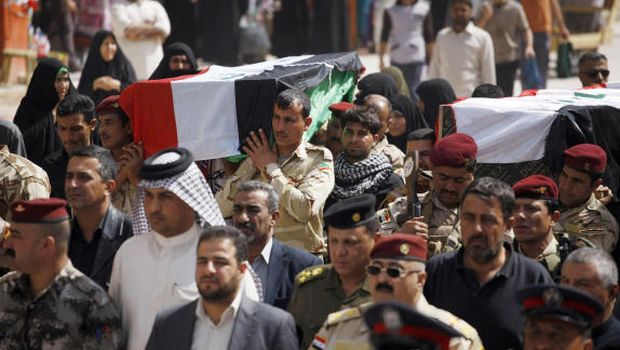Iraqi MP Hanan Al-Fatlawi banged her hand on the table during a TV program on which she appeared, speaking angrily but effortlessly, and said: “For every seven Shi’ites killed, we want seven Sunnis [killed] in their place.”
Of course, the seriousness of the situation which compelled Fatlawi to make such a statement is diminished by her words. An Iraqi parliamentarian has dismissed the authority of the constitution and the law to declare that the time has come to implement the principle of “an eye for an eye” to manage the sectarian conflict that is currently raging in Iraq.
The media uproar which followed the Iraqi MP’s comments did not deter her or encourage her to retract her comments, and the echoes of her statement remained loud in the public arena. To top it off, Fatlawi is a member of the State of Law parliamentary coalition led by Prime Minister Nuri Al-Maliki.
The Iraqi MP’s TV moment of error ignited a firestorm on social media, worsening the sectarian discourse in the country and intensifying its hate campaigns. It is language that encourages the shedding of blood, which is what is taking place in Iraq and in many surrounding countries.
In fact, the Iraqi MP did not depart from the line taken by the prime minister himself two weeks ago when he declared the principle of “blood for blood” in the case of the killing of journalist Mohammad Al-Bdaiwi at the hands of a Republican Guard officer.
The killing of the journalist was exploited in a manner which has not been seen in other daily killings taking place across the country. It is an incident which took place at a time which suited the current circumstances, and which, in turn, Maliki tried to benefit from. The officer who committed the murder is Kurdish, which turned an isolated crime into a national issue that nearly ignited a new Arab–Kurdish crisis in Iraq.
Of course, linking Fatlawi’s comments, and before her Maliki’s, to the events in Iraq is not an attempt to lay all the blame for the country’s ills on them alone—this is, after all, a country where political violence kills dozens of people daily, Sunnis and Shi’ites, Arab, Kurds, and Turkmen alike.
However, with all this violence, it has become clear that coexistence between the different parts of the fabric of Iraqi society has been weakened to a level where a simple detail could lead to an explosion of hostile statement in the media, in its traditional or electronic form.
The country is in the midst of major internal and regional crises, and the discourse presented by Maliki is part of these crises, and can even count as one of its “faces.”
No one will be safe from the worsening situation in Iraq; it is like a sin which has many guilty parties. But for the prime minister and MPs from his coalition to turn the bloody discourse of sectarian violence into an official language is a major moment in history, 10 years into the experiment that is the new Iraq.
It is a rapid decline and a frantic return to a discourse which raises the slogans of revenge and blood, and drops all that remains of a state of law—if there was anything left of it in the first place.
